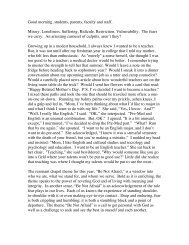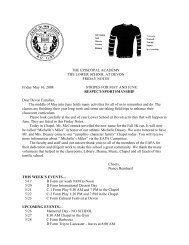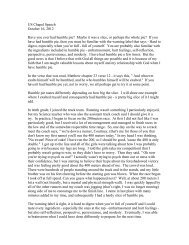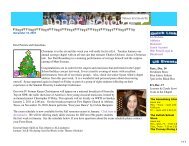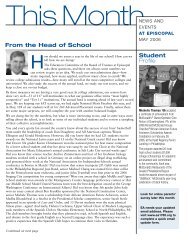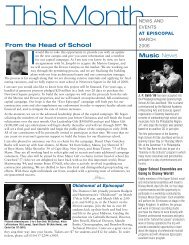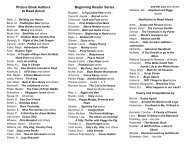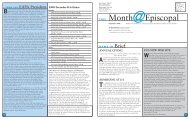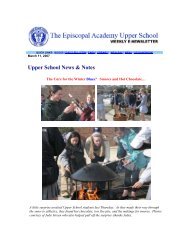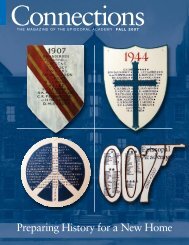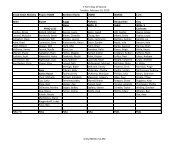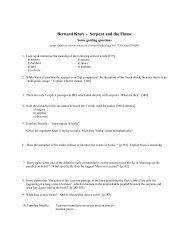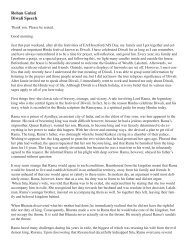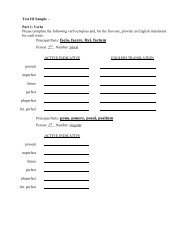The Birth of Team 2234 The Birth of Team 2234 - Episcopal Academy
The Birth of Team 2234 The Birth of Team 2234 - Episcopal Academy
The Birth of Team 2234 The Birth of Team 2234 - Episcopal Academy
You also want an ePaper? Increase the reach of your titles
YUMPU automatically turns print PDFs into web optimized ePapers that Google loves.
Athletics<br />
One <strong>of</strong> the finest squash programs in the country will have matching<br />
facilities when <strong>Episcopal</strong> opens in Newtown Square in September <strong>of</strong> 2008.<br />
Ten <strong>Episcopal</strong> families have each contributed $100,000 to name a squash<br />
court on the new campus. In addition, two families have each contributed<br />
$50,000 to name a squash gallery seating area. An upcoming issue <strong>of</strong> the<br />
Campaign Newsletter will recognize these donors, as well as Jim Zug’s ’58<br />
efforts leading the fundraising.<br />
that played against the boys and brought<br />
in Mohibullah Khan, one <strong>of</strong> the world<br />
champion Khan pros, to talk to and play<br />
games against the students.<br />
In 1970, Poor left <strong>Episcopal</strong> and Darwin<br />
Kingsley stepped in for the next five<br />
seasons. <strong>The</strong> head <strong>of</strong> the Middle School,<br />
Kingsley was an avid doubles player and<br />
president <strong>of</strong> the U.S. Squash Association<br />
at the time. He took the varsity to the national<br />
five-man team competition, where<br />
they reached the finals beating highly<br />
fancied adult teams. <strong>The</strong> only blip was<br />
in late February 1974 when the team lost<br />
its second match to Penn Charter 3-4<br />
(after beating them 6-1). Kingsley had<br />
announced his departure (to become the<br />
first executive director <strong>of</strong> the U.S. Squash<br />
Association) and things began to unravel.<br />
“Disheartened by their loss to Penn Charter,”<br />
the Tabula reported, “many players<br />
on the team seemed to play mainly for<br />
themselves. Much <strong>of</strong> the past structure <strong>of</strong><br />
the team fell into oblivion.”<br />
Mateer Returns<br />
To help revive the program, Diehl Mateer<br />
returned to his alma mater to coach<br />
the team in the late 1970s. <strong>The</strong>y won the<br />
Inter-Ac his first season, with a team <strong>of</strong><br />
eight seniors in the top 10, but then the<br />
talent soon dried up and Haverford came<br />
back into ascendance. “I loved coaching<br />
the team,” Mateer said, “especially<br />
with my son Jeffrey on the squad, and<br />
it wasn’t bad for my own game, keeping<br />
me in shape for doubles, as I got to get<br />
out and hit with the top players.”<br />
<strong>The</strong>re was no national championship<br />
for high schools until 2004, but <strong>Episcopal</strong><br />
easily claimed the un<strong>of</strong>ficial title. It<br />
had an unblemished record in the toughest<br />
interscholastic league in the country<br />
(usually playing evens or odds in the<br />
matches) and it won at the Nichols<br />
School Invitational in Buffalo and later<br />
the Choate Invitational.<br />
This era boasted an incredible number<br />
<strong>of</strong> top players, many coming from the<br />
same family. <strong>The</strong>re were the Page brothers:<br />
Ray ’66; Palmer ’68, who went on<br />
to win the national intercollegiates and<br />
then become executive director <strong>of</strong> the<br />
U.S. squash association; David ’71; and<br />
Tom ’77, who won the national singles<br />
title, two national doubles titles, was<br />
a top pro on the hardball singles tour<br />
and won numerous pro doubles tournaments.<br />
<strong>The</strong>re were the Mateers, Gil ’73,<br />
who won the national juniors and four<br />
national doubles titles and Jeffrey ’79.<br />
<strong>The</strong>re were the Havens: Tim ’64, Peter<br />
’72, and John ’75. <strong>The</strong>re were the Bottgers,<br />
David ’70 and John ’72, who won a<br />
national doubles title. In addition, there<br />
was Joe Swain ’71, who got to the semis<br />
<strong>of</strong> the national singles while at <strong>Episcopal</strong><br />
and won an unprecedented three straight<br />
school titles; George Bell ’75, who went<br />
on to be a columnist for Squash News<br />
in the 1980s; Bob Callahan ’73 who is<br />
now the legendary coach at Princeton;<br />
and John Nimick ’77, a lifer, who went<br />
29-1 in his varsity career in prep school<br />
maters and then won a national intercollegiate<br />
title, a national singles title, and<br />
went onto a successful pro hardball career<br />
(including two North American<br />
Open titles) before becoming the executive<br />
director <strong>of</strong> the pro s<strong>of</strong>tball tour and<br />
then a pro tournament event director.<br />
But there were some unsung heroes<br />
down at the lower part <strong>of</strong> the ladder that<br />
played as important roles as the famed<br />
stars above. One was Clayton Platt ’73,<br />
who gutted out a tough win with the team<br />
match tied at 4-4 to beat a favored Penn<br />
junior varsity. And much <strong>of</strong> the success<br />
<strong>of</strong> the program stemmed from the junior<br />
varsity and Middle School coaches, especially<br />
Chip Hollinger, who led the 7th<br />
and 8th grade team for 30 years. Above<br />
all, there was a feeling <strong>of</strong> good will; the<br />
most coveted annual prize for the team<br />
was the Wayne C. Astley Award “for<br />
ability, courtesy, and sportsmanship.”<br />
<strong>The</strong> Girls Arrive<br />
While the boys’ team went into another<br />
decline (Haverford won the Inter-Ac<br />
every year from 1978 through 1993),<br />
<strong>Episcopal</strong> found itself with a new wrinkle<br />
in the age-old issue <strong>of</strong> court time: girls.<br />
As the co-educational process brought<br />
girls into the upper grades, girls started<br />
wanting to play. In the mid-1980s,<br />
a couple <strong>of</strong> enterprising 7th grade girls<br />
played on the boys Middle School team.<br />
One girl, Alix Golaski, was cut from the<br />
team in 8th grade and, in 1985, after a<br />
miserable year spent sitting on the basketball<br />
team bench, she and a few friends<br />
formed a girls squash club. Bill Whelan,<br />
who coached the boys’ team from 1980-<br />
83, served as their coach; practice was in<br />
the morning before school.<br />
In 1988, the team received varsity<br />
status with Betsy Lippincott, an English<br />
teacher, as coach; they used two<br />
old courts at the Green Briar Country<br />
Club, an apartment complex that used<br />
to house the Overbrook Country Club.<br />
“It’s a great thing at that age when you<br />
have a new team and adults take you seriously,”<br />
said Golaski ’88.<br />
Like the boys a half-century earlier,<br />
the first teams struggled. Christina Jones<br />
coached for one year and then Donna<br />
Heckscher, Maurice’s wife and mother<br />
<strong>of</strong> Kellen ’97, took over and built up the<br />
program for four years until it was on<br />
the cusp <strong>of</strong> defeating the local girls juggernaut<br />
Agnes Irwin. <strong>The</strong> Tabula noted<br />
her “supportive attitude and interesting<br />
practices.” In 1996, John Sp<strong>of</strong>ford ’74, a<br />
Lower School teacher at <strong>Episcopal</strong>, took<br />
over the team and suddenly undefeated<br />
seasons began cascading down. <strong>The</strong> success<br />
that year was astounding: the team<br />
won 250 individual games and lost just<br />
12. Among the standouts were the Hall<br />
girls, Colby ’98 and Louisa ’00, who<br />
won three straight national junior titles<br />
while at <strong>Episcopal</strong>; Andrea McNeely ’98;<br />
and Sarah West ’99.<br />
In 2000, Holly Barnes took over and<br />
continued the skein <strong>of</strong> victories. In 2004-<br />
05, the coach was Demer Holleran. If<br />
<strong>Episcopal</strong> was lucky to have Diehl Mateer,<br />
one <strong>of</strong> the greatest American players<br />
ever as coach, then it was equally so with<br />
Holleran, who had won more than two<br />
dozen national singles and doubles titles.<br />
Cam Hopkins then coached for one year<br />
and then this past winter, Dawn Grey<br />
took over.<br />
In February 2007, for the first time ever,<br />
an <strong>Episcopal</strong> team was able to unequivocally<br />
lay claim to a national squash title<br />
when the <strong>Episcopal</strong> girls blasted their<br />
way to a surprising first place finish at<br />
the national high school championships<br />
in New Haven (see page 14). Recent<br />
standouts include the Riley sisters, Casey<br />
’00 and Brooksie ’03, and Logan Greer<br />
’07, who just won the national junior title<br />
in March 2007.<br />
MASA Formed; Reclaiming<br />
the Inter-Ac Title<br />
It took the girls’ team 19 years to<br />
go from a rookie program to national<br />
champions, and it took the boys the<br />
same amount <strong>of</strong> time to regain the Inter-<br />
Ac title. But those seemingly dark years<br />
were not so bleak. Tim Kent, the classics<br />
teacher who captained the team at<br />
Hamilton, took over in 1984 and helped<br />
strengthen the program. <strong>The</strong>re were<br />
strong players like Bill Marvin ’88, who<br />
played number one for three seasons,<br />
Sam Halpert ’89, Scott Hammond ’92,<br />
and Andrew Purcell ’93. After arguments<br />
about ladders, Kent and Hill School<br />
coach Wendell Chestnut formed the Mid-<br />
Atlantic Squash Association (MASA), a<br />
league that included all Inter-Ac teams<br />
plus Hill, Lawrenceville, and Shipley.<br />
MASA helped broaden squash in the<br />
Philadelphia-area, especially with its festive<br />
season-ending tournament at Penn.<br />
Kent encouraged the last renovation <strong>of</strong><br />
the courts in 1990 and helped finesse the<br />
troublesome transition from hardball<br />
to s<strong>of</strong>tball squash, with the split season<br />
<strong>of</strong> 1993 and the full shift to s<strong>of</strong>tball in<br />
1994. He also demanded that court time<br />
be equally split between girls and boys,<br />
so that the girls program would have a<br />
chance to prosper.<br />
<strong>The</strong> big moment for the boys program<br />
was its return to Inter-Ac glory on February<br />
1, 1994 in front <strong>of</strong> 100 screaming<br />
fans in the Shiel courts. <strong>Episcopal</strong> topped<br />
Haverford 4-3. <strong>The</strong> boys also claimed a<br />
mythical national title when it won at<br />
the Taft Interscholastic Tournament that<br />
same year. <strong>The</strong> team also won Taft in<br />
1995 and went undefeated, like the girls,<br />
in 1996. Those teams were led by Dave<br />
McNeely ’96, who won three straight<br />
national junior titles and captured one<br />
national singles title while in college; the<br />
Sebring brothers, Harrison ’94 and Marshall<br />
’97; and Addison West ’97.<br />
John Sp<strong>of</strong>ford, who had assisted the<br />
team for years, took over from Tim Kent<br />
in 1999 and the team, although not as<br />
dominant, continued to produce great<br />
players. Most noteworthy were Trevor<br />
McGuinness ’06, who won the national<br />
junior title and Todd Harrity ’09, who<br />
became one <strong>of</strong> the youngest national junior<br />
titlists when he won the tournament<br />
in March 2007.<br />
Continuing the Legacy<br />
How do you judge a program? In the<br />
96 years <strong>of</strong> combined varsity play, <strong>Episcopal</strong><br />
has been the epitome <strong>of</strong> excellence.<br />
Three undefeated seasons; 24 league<br />
titles for the boys and nine for girls. National<br />
junior champions: six boys and<br />
two girls. Future national singles champions:<br />
five, so far. <strong>Episcopal</strong> has played<br />
everyone: 25 different high schools and<br />
16 different colleges.<br />
With both Todd Harrity and Logan<br />
Greer as current national junior champions,<br />
it is the first time in U.S. squash<br />
history that both the best boy and best<br />
girl in the country play at the same<br />
school. But no one should be surprised.<br />
<strong>Episcopal</strong> is a school that values history.<br />
Every time they step onto the court,<br />
they walk, literally, in the footsteps <strong>of</strong><br />
Jeff Shiel. n<br />
James Zug is the<br />
author <strong>of</strong> Squash: A<br />
History <strong>of</strong> the Game<br />
(Scribner, 2003) and<br />
a senior writer at<br />
Squash Magazine.<br />
He is the son <strong>of</strong> Jim<br />
Zug ’58.<br />
18 Connections spring 2007 19



